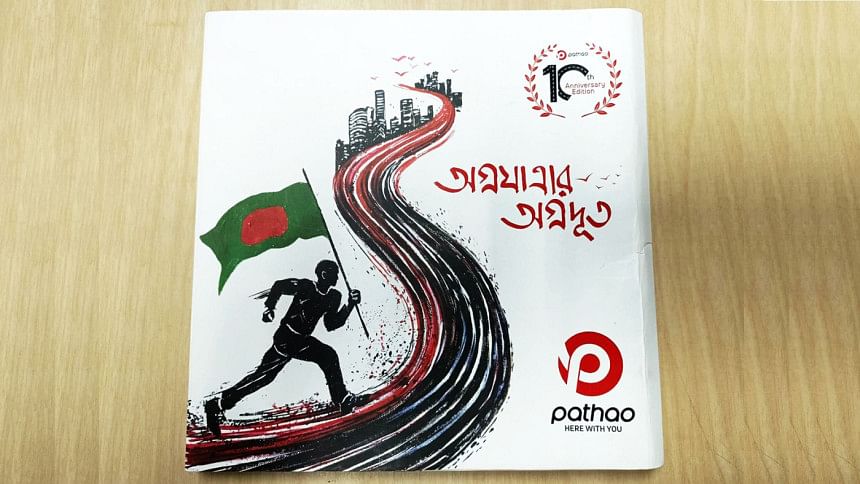The human stories behind the Pathao brand

Ogrojatrar Ogrodoot is a tribute to the unsung heroes—riders, drivers, entrepreneurs, and employees—whose resilience and determination have not only built Pathao but also played a pivotal role in driving Bangladesh's digital transformation forward.
Beyond corporate strategies and growth figures, Ogrojatrar Ogrodoot shines a light on the real architects of Pathao's success—its riders, drivers, entrepreneurs, and employees. The book speaks to the impact of the platform on ordinary people, from students earning extra income through gig work to women breaking societal norms by stepping into ride-sharing and delivery jobs. These deeply personal accounts reinforce a universal truth: behind every thriving startup lies the aspirations, struggles, and perseverance of real people.
Leadership in the face of crisis
The early chapters provide a deeper understanding of leadership decisions that shaped Pathao's journey, offering insights into the strategic mindset of CEO Fahim Ahmed and co-founder Shifat Adnan. Their vision and resilience were instrumental in guiding the company through its most challenging times.
One of the defining periods in Pathao's history was the Covid-19 crisis, a time of uncertainty and financial strain. Unlike many companies that resorted to layoffs, Pathao's leadership took a different approach. Rather than cutting jobs, executives chose to reduce their own salaries, demonstrating commitment to their workforce. This decision, driven by the belief that people are the backbone of the organisation, ultimately played a crucial role in Pathao's recovery and return to profitability.
Fahim highlights three transformative decisions that propelled Pathao's success. The first was a bold leadership transition, bringing fresh perspectives and renewed energy to the company. The second was the ambitious expansion beyond major cities, recognising an untapped demand for digital services in semi-urban and rural areas. Though risky, this move proved highly rewarding. The third, and perhaps most innovative, was Pathao's entry into fintech. By integrating digital payment solutions, credit offerings, and instant pay services, the company positioned itself at the forefront of Bangladesh's financial technology revolution.
The chapter also offers a deeply personal reflection on the July 2024 uprising, an event that left a profound impact on Fahim. He voices his concerns about the country's increasing brain drain and stresses the need for political stability to inspire young talent to build a future in Bangladesh rather than seeking opportunities abroad. With his wife being a university professor, he found himself closely involved with student movements, witnessing their passion and struggles firsthand.
One of the book's most poignant moments is Fahim's recollection of the tragic passing of Abu Sayed. Through his journal entries, he captures the emotions of those tumultuous days, reflecting on his efforts to support students by offering shelter, supplies, and guidance in articulating their demands. Looking back, he expresses a deep sense of gratitude for standing with the youth, reinforcing his belief in resilience, unity, and the power of collective action.
Pathao's true builders: the people
As the book progresses, it shifts focus to the people who have helped build Pathao from the ground up—ordinary individuals whose lives have been transformed by the platform.
One particularly inspiring story is that of Toya Mart, a small business founded by a couple who initially made just Tk 240 in daily profit from two orders. Despite this modest start, they persevered, gradually expanding their operations with Pathao's support. Today, their business has grown into a 5,200 sq. ft. operation in the country's largest port city, employing 55 people. Their journey is a testament to the impact of digital platforms in empowering small businesses and entrepreneurs.
Another remarkable story is that of Jubayer, a determined dreamer who aspired to build his own business but faced skepticism from his family. With difficulty, he secured a Tk 5 lakh investment to start a cloud kitchen. Thanks to the continuous support of the Pathao Food team, his business thrived, and he now owns three cloud kitchens. The same family members who once doubted his abilities now seek his advice, proving that persistence, when combined with the right platform, can turn dreams into reality.
The book also tells the story of Mahmudul, a young man who once aspired to be a cricketer but found himself navigating the corporate world instead. In late 2020, he joined Pathao's Courier team and quickly distinguished himself by introducing new services catering to merchants dealing in liquid and perishable goods outside Dhaka. His favorite quote, "Everybody wants to go to heaven, but no one wants to die," reflects a common societal mindset—people desire success but hesitate to take the necessary risks. Mahmudul, however, embraced the challenge, proving that real progress begins with action. While he may not have become a cricketer, he has impacted lives in his own way, bringing solutions and smiles to many.
Pathao - Not just a typical workplace
In a country like ours, where employees often take jobs as shackles, which bind them from doing things in innovative ways, which bind them to be kind to others due to the monotonous responsibilities. Organisations like Partho sails against the tides and empowers the souls who contradict with such rigid narratives, rather go beyond and solve bigger problems. Women like Radhika Afreen Oni show us that no matter how tiny you think your footsteps are, with continuous persuasion, your impact can be gigantic. Dreamers like Tarikul Islam Nehal show us that no boundary is an actual boundary, rather it's your own imagination blocking you from doing something big. Solver such as Javid Malek breaks down to us how sharing happiness with others can have larger returns left for you, ending up making you the happiest person. These magical stories tell us we do not lose when we give, rather we gain more and more from numerous other earthly or spiritual sources, the sorts of energies and feelings which often remain untold.
Conclusion: a legacy of inspiration
Ogrojatrar Ogrodoot is more than just a corporate chronicle -- it is a collection of 25 human-centered stories that celebrate resilience, ambition, and the power of opportunity.
Among all these inspiring narratives, one of the most iconic is "Pathao and Me", Fahim Ahmed's personal journey with the company. His story, like the many others in this book, serves as a reminder that startups are not just about technology or business models -- they are about people, vision, and the courage to keep moving forward.
As Bangladesh continues to embrace digital transformation, Ogrojatrar Ogrodoot will remain as a symbol of hope and courage for aspiring entrepreneurs, innovators, and changemakers. It is a book that does not just document the past but also inspires the future -- a legacy that will be followed for years to come.
The writer is currently the chief business officer at The Daily Star. He is also an IVLP Exchange alumni member of the U.S State Department.

 For all latest news, follow The Daily Star's Google News channel.
For all latest news, follow The Daily Star's Google News channel. 








Comments